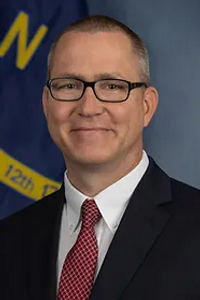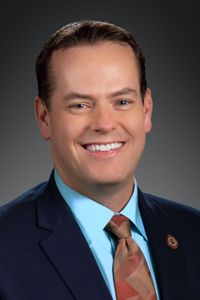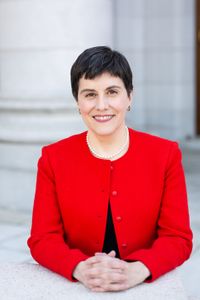Heidi Ganahl
Heidi Ganahl first jumped into politics in 2016 when she was elected to an at-large seat on the University of Colorado’s Board of Regents. Prior to that, she had never held or run for public office. Ganahl’s background was primarily in business, having founded the pet care franchise Camp Bow Wow in 2000. She later went on to launch SheFactor, an online community for women entrepreneurs, in 2012.
Born and raised in Colorado, Ganahl earned her bachelor’s degree in business from CU Boulder and an MBA from the University of Denver. Before starting Camp Bow Wow, she worked in marketing and communications roles for various companies. Ganahl has cited her experience as a business owner and job creator as what motivated her to first run for the Board of Regents.
Ganahl’s Business Ventures
Camp Bow Wow was the first retail franchise concept for pet care services. The business provides premier dog day care, boarding, grooming, and training services. Since its founding, Camp Bow Wow has grown to over 200 locations across North America. It remains one of the largest pet care franchise businesses in the industry.
In addition to Camp Bow Wow, Ganahl has founded several other businesses focused on supporting women entrepreneurs and giving back to communities. She started SheFactor in 2012 as an online peer community offering inspiration, education, and support for women business owners.
Ganahl also formed the Bow Wow Buddies Foundation, a non-profit that provides funding and support for shelters and rescues across the U.S. Through her business ventures and non-profit work, she has demonstrated a commitment to community service and empowering others.
Ganahl’s Political Career
Ganahl’s first elected position was serving as an at-large member on the CU Board of Regents starting in 2017. The regents are responsible for guiding the university’s administration on budget, academics, research, admissions, tuition, and other policy matters.
While a regent, Ganahl advocated for keeping tuition costs down and improving transparency. She also called for CU to take stronger action on free speech issues. In 2021, she opposed fellow regents who sought to fire CU President Mark Kennedy.
Overall, Ganahl compiled a moderately conservative record during her single term as a regent. Her experience on the board gave her the profile to mount a run for higher state office.
Ganahl’s Campaign for Governor
Ganahl’s Republican Nomination
On September 7, 2021, Ganahl officially announced her campaign for the Republican nomination for Governor of Colorado. She joined a primary field that already included Greg Lopez, a former Mayor of Parker.
Ganahl ran on a platform of crime reduction, education reform, eliminating state income tax, and what she termed “common-sense conservatism.” She drew contrasts between her business background and the political experience of her primary opponent.
The Republican primary saw over $12 million in total spending. Ganahl significantly outraised and outspent Lopez, taking in $7.4 million compared to his $2.6 million. This funding advantage helped propel her to a double-digit victory in the June 2022 primary.
Ganahl’s General Election Opponent
After securing the Republican nomination, Ganahl shifted focus to the November general election. She faced incumbent Democratic Governor Jared Polis as her opponent.
Polis was initially elected Governor of Colorado in 2018 when he defeated Republican Walker Stapleton by over 10 percentage points. He was seeking a second 4-year term in 2022. Polis entered the race as the favorite, given Colorado’s recent Democratic leanings in statewide contests.
However, Ganahl saw an opportunity to compete by focusing her messaging on crime, education, the economy, and what she called Polis’ “extreme agenda.” She looked to peel off independents and moderates to build a winning coalition.
Ganahl’s Campaign Platform and Priorities
Ganahl centered her campaign on a few key policy priorities aimed at contrasting herself with Polis:
Economy and Jobs
- Eliminating the state income tax over time to reduce the tax burden on residents and attract new businesses.
- Cutting red tape and regulations to make it easier for small businesses and entrepreneurs to operate in Colorado.
- Investing in career training and vocational education to create a talent pipeline.
Education
- Expanding school choice through charter schools, opportunity scholarships, and education savings accounts.
- Increasing transparency and accountability for schools through an A-F grading system.
- Giving parents a greater voice in curriculum decisions.
Energy and Environment
- Balancing energy production with conservation by utilizing Colorado’s natural gas, oil, and coal resources responsibly alongside renewables.
- Opposing regulations like Prop 120 that would lock up large swaths of public lands from development.
- Investing in water storage infrastructure.
Healthcare
- Making healthcare more affordable by allowing insurance sales across state lines.
- Increasing price transparency for medical procedures and services.
- Opposing government-run healthcare plans.
Ganahl’s Fundraising Efforts
Campaign finance disclosures through mid-October showed Ganahl raising over $3.4 million for her general election campaign and having about $660k cash on hand. Her fundraisinghaul put her at a significant disadvantage compared to Polis, who raised over $11 million.
Ganahl relied heavily on a donor base of individuals, particularly those associated with the oil and gas industry. She also attracted substantial contributions from education reform advocates.
However, Ganahl failed to keep pace with Polis in fundraising or garner the level of financial support necessary to mount an effective statewide campaign. This monetary deficit hampered her ability to promote her platform and run competitive advertising.
Ganahl’s Endorsements
On the endorsement front, Ganahl secured backing from prominent Republicans like former Senator Cory Gardner, Congressman Ken Buck, and former Governor Bill Owens. The state’s Republican establishment largely coalesced behind her candidacy after she won the primary.
At the national level, Ganahl received endorsements from Senator Ted Cruz and House Republican leader Kevin McCarthy. This signaled Republican hopes of potentially expanding the gubernatorial playing field.
Ganahl also attracted support from business groups like the Denver Metro Chamber of Commerce and some law enforcement organizations. Meanwhile, state-level education reform groups strongly backed her bid due to her stance on school choice.
Assessing Ganahl’s Chances
Ganahl’s Strengths as a Candidate
Ganahl brought several strengths to her campaign that gave her a base of support to build from:
- Her business background and outsider status contrasted effectively against career politician Jared Polis. This allowed her to run an anti-establishment campaign.
- As a moderate, pro-business Republican, she had the potential to appeal to suburban voters who have been drifting away from the GOP in recent election cycles.
- Her substantive policy knowledge on topics like education and workforce development shown through during the race.
- Ganahl maintained a busy travel schedule crisscrossing the state and demonstrated strong grassroots campaign skills.
Obstacles Facing Ganahl’s Campaign
However, Ganahl also faced substantial headwinds in her bid to unseat the incumbent Governor:
- Running as a Republican in a state that has trended increasingly Democratic over the last decade, particularly in statewide contests.
- A significant fundraising disadvantage compared to Polis, who spent lavishly from his personal fortune.
- Low name recognition entering the race compared to the well-known Polis.
- The absence of major scandals or liability surrounding Polis that she could seize upon to shift momentum.
Factors in Ganahl’s Favor
Despite the challenges, a few factors still gave Ganahl a possible glimmer of hope:
- Polis’ approval ratings showed some vulnerability, with concerns about crime and the economy creating potential openings for Ganahl’s law-and-order messaging.
- High inflation and economic anxiety offered avenues to connect with moderate and independent voters about kitchen-table issues.
- Intensity of support possibly tilting to Ganahl, providing enthusiasm and grassroots energy that money can’t always buy.
- Ganahl’s strong performance in the debates, presenting a confident and compelling alternative.
The Significance of the Governor’s Race
Importance of the Colorado Governorship
The Governor of Colorado holds substantial power over an annual state budget of over $30 billion. The office also has sole responsibility for appointing judges and state cabinet officials.
With Colorado expected to gain a new House seat in 2022 reapportionment, the Governor will have influence over the new congressional and state legislative maps drawn. This authority provides the ability to impact partisan control of those bodies.
Additionally, the Governor has the power to sign or veto all legislation passed by the General Assembly. This grants them considerable sway over the policy direction of the state.
Impact on State Policy
A Ganahl victory would have significant implications for a variety of state-level policy issues:
- Education – More school choice programs and less curriculum oversight by the state.
- Energy – Greater leverage for oil and gas interests, less emphasis on renewables.
- Fiscal Policy – Significant income tax cuts and tighter control on spending growth.
- Social Issues – Stronger protections for gun rights and restrictions on access to abortion.
Meanwhile, a Polis win likely entails continuity on his first-term agenda:
- Education – Increased public school funding and further expansion of universal pre-K and free kindergarten.
- Energy – Continued promotion of renewable production while limiting oil and gas activity.
- Fiscal Policy – Calls for tax relief balanced against sustaining growth in social spending.
- Social Issues – No major changes to existing laws on guns and abortion access.
Role in 2024 and Beyond
The Governor’s race also has importance extending beyond the state level:
- The outcome provides clues about the national political environment heading into the 2024 presidential election cycle.
- Control of the Governor’s office gives a party advantage in building infrastructure and machinery for the pivotal swing state.
- The Governor elected in 2022 will occupy the seat during next round of redistricting after the 2030 Census.
Conclusion
Heidi Ganahl faced an uphill battle in her campaign to unseat incumbent Governor Jared Polis. Colorado’s Democratic leanings in recent statewide elections and Polis’ fundraising advantage provided tough obstacles for Ganahl to overcome.
However, Ganahl brought strengths as a moderate, reform-minded outsider with substantive policy knowledge. Her energetic campaigning and strong debate performances kept the race competitive into the final weeks.
Ultimately, the Governor’s race carried high stakes not only for Colorado’s future policy direction, but also as an indicator for the national political winds. The outcome provided both risks and rewards for whichever candidate emerged victorious.
Regardless of the final result, Heidi Ganahl left a significant mark by shattering glass ceilings. Her nomination as the first female gubernatorial candidate for a major party in Colorado history serves as an inspiration. This ensures that win or lose, Ganahl has already cemented her legacy.
FAQs
Q: What experience did Heidi Ganahl have before running for governor?
A: Ganahl’s professional background was primarily in business. She founded the pet care company Camp Bow Wow and the women’s entrepreneur community SheFactor. Her only previous elected experience was one term as an at-large member of the CU Board of Regents from 2017-2023.
Q: What were some of Ganahl’s main policy positions?
A: Ganahl campaigned on eliminating the state income tax, expanding school choice, balancing fossil fuels and renewables, reducing crime, and opposing government-run healthcare. She took more conservative stances on fiscal, education, and energy issues.
Q: How much money did Ganahl raise for her campaign?
A: According to disclosures through mid-October 2022, Ganahl had raised around $3.4 million for the general election campaign and had $660k cash on hand. This amount was significantly less than her opponent Jared Polis.
Q: What factors worked in Ganahl’s favor in the election?
A: Ganahl had appeal as a political outsider and moderated conservatives. Concerns about crime and the economy offered openings against the incumbent. Her strong debate performances increased enthusiasm among supporters.
Q: Why was the Colorado Governor’s race significant?
A: The Governor has huge sway over the state’s fiscal and policy direction. The outcome also provided insights about the national political landscape heading into the 2024 presidential race.







